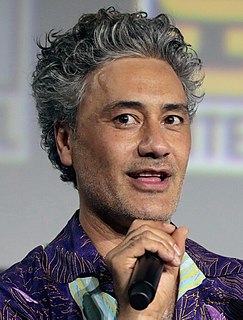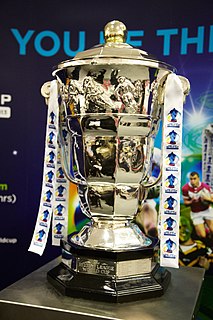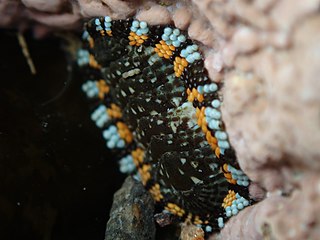
The Cook Islands is a self-governing island country in the South Pacific Ocean in free association with New Zealand. It comprises 15 islands whose total land area is 240 square kilometres (93 sq mi). The Cook Islands' Exclusive Economic Zone (EEZ) covers 1,960,027 square kilometres (756,771 sq mi) of ocean.

Oceania is a geographical region that includes Australasia, Melanesia, Micronesia, and Polynesia. Spanning the Eastern and Western hemispheres, Oceania is estimated to have a land area of 8,525,989 square kilometres (3,291,903 sq mi) and a population of around 44.5 million as of 2021. When compared with the continents, the region of Oceania is the smallest in land area and the second least populated after Antarctica. Its major population centres are Sydney, Melbourne, Brisbane, Perth, Auckland, Adelaide, and Honolulu.

Wellington is the capital city of New Zealand. It is located at the south-western tip of the North Island, between Cook Strait and the Remutaka Range. Wellington is the second-largest city in New Zealand by metro area, and is the administrative centre of the Wellington Region. It is the world's southernmost capital of a sovereign state. Wellington features a temperate maritime climate, and is the world's windiest city by average wind speed.

Sir Edmund Percival Hillary was a New Zealand mountaineer, explorer, and philanthropist. On 29 May 1953, Hillary and Sherpa mountaineer Tenzing Norgay became the first climbers confirmed to have reached the summit of Mount Everest. They were part of the ninth British expedition to Everest, led by John Hunt. From 1985 to 1988 he served as New Zealand's High Commissioner to India and Bangladesh and concurrently as Ambassador to Nepal.

The New Zealand national rugby union team, commonly known as the All Blacks, represents New Zealand in men's international rugby union, which is considered the country's national sport. The team won the Rugby World Cup in 1987, 2011 and 2015. They were the first country to win the Rugby World Cup 3 times.

The flag of New Zealand, also known as the New Zealand Ensign, is based on the British maritime Blue Ensign – a blue field with the Union Jack in the canton or upper hoist corner – augmented or defaced with four red stars centred within four white stars, representing the Southern Cross constellation.

The New Zealand national cricket team represents New Zealand in men's international cricket. Named the Black Caps, they played their first Test in 1930 against England in Christchurch, becoming the fifth country to play Test cricket. From 1930 New Zealand had to wait until 1956, more than 26 years, for its first Test victory, against the West Indies at Eden Park in Auckland. They played their first ODI in the 1972–73 season against Pakistan in Christchurch.

New Zealand is an island country in the southwestern Pacific Ocean. It consists of two main landmasses—the North Island and the South Island —and over 700 smaller islands. It is the sixth-largest island country by area, covering 268,021 square kilometres (103,500 sq mi). New Zealand is about 2,000 kilometres (1,200 mi) east of Australia across the Tasman Sea and 1,000 kilometres (600 mi) south of the islands of New Caledonia, Fiji, and Tonga. The country's varied topography and sharp mountain peaks, including the Southern Alps, owe much to tectonic uplift and volcanic eruptions. New Zealand's capital city is Wellington, and its most populous city is Auckland.

Taika David Cohen, known professionally as Taika Waititi, is a New Zealand filmmaker, actor, and comedian. He is a recipient of an Academy Award, a BAFTA Award, and a Grammy Award, and has received two nominations at the Primetime Emmy Awards. His feature films Boy (2010) and Hunt for the Wilderpeople (2016) have each been the top-grossing New Zealand film.

The Rugby League World Cup is an international rugby league tournament contested by the top national representative teams. The tournament is administered by the International Rugby League and was first held in France in 1954, which was the first World Cup held for any form of rugby football.

Durvillaea antarctica, also known as cochayuyo and rimurapa, is a large, robust species of southern bull kelp found on the coasts of Chile, southern New Zealand, and Macquarie Island. D. antarctica, an alga, does not have air bladders, but floats due to a unique honeycomb structure within the alga's blades, which also helps the kelp avoid being damaged by the strong waves.

Sypharochiton pelliserpentis is a species of chiton in the family Chitonidae. As the species name suggests, the surface of the girdle in this chiton has a pattern of overlaying scales resembling snakeskin.

Sypharochiton sinclairi is a species of chiton in the family Chitonidae.
Sypharochiton torri is a species of chiton in the family Chitonidae found in New Zealand.

Auckland is a large metropolitan city in the North Island of New Zealand. The most populous urban area in the country and the fifth largest city in Oceania, Auckland has an urban population of about 1,440,300. It is located in the greater Auckland Region—the area governed by Auckland Council—which includes outlying rural areas and the islands of the Hauraki Gulf, and which has a total population of 1,695,200. While Europeans continue to make up the plurality of Auckland's population, the city became multicultural and cosmopolitan in the late-20th century, with Asians accounting for 31% of the city's population in 2018. Auckland has the fourth largest foreign-born population in the world, with 39% of its residents born overseas. With its large population of Pasifika New Zealanders, the city is also home to the biggest ethnic Polynesian population in the world. The Māori-language name for Auckland is Tāmaki Makaurau, meaning "Tāmaki desired by many", in reference to the desirability of its natural resources and geography.

Jacinda Kate Laurell Ardern is a New Zealand politician who has been serving as the 40th prime minister of New Zealand and leader of the Labour Party since 2017. A member of the Labour Party, she has been the member of Parliament (MP) for Mount Albert since 2017.

Australasia is a region that comprises Australia, New Zealand and some neighbouring islands in the Pacific Ocean. The term is used in a number of different contexts, including geopolitically, physiogeographically, philologically, and ecologically, where the term covers several slightly different, but related regions.

The Māori are the indigenous Polynesian people of mainland New Zealand. Māori originated with settlers from East Polynesia, who arrived in New Zealand in several waves of canoe voyages between roughly 1320 and 1350. Over several centuries in isolation, these settlers developed their own distinctive culture, whose language, mythology, crafts, and performing arts evolved independently from those of other eastern Polynesian cultures. Some early Māori moved to the Chatham Islands, where their descendants became New Zealand's other indigenous Polynesian ethnic group, the Moriori.

Chitonida is an order of chitons.

On 15 March 2019, two consecutive mass shootings occurred in a terrorist attack on two mosques in Christchurch, New Zealand. The attacks, carried out by a lone gunman who entered both mosques during Friday prayer, began at the Al Noor Mosque in the suburb of Riccarton at 1:40 pm and continued at the Linwood Islamic Centre at 1:52 pm. 51 people were killed and 40 were injured.


















